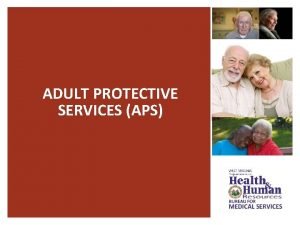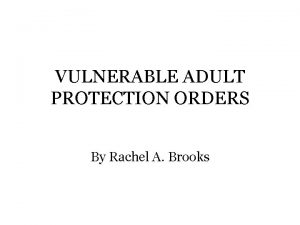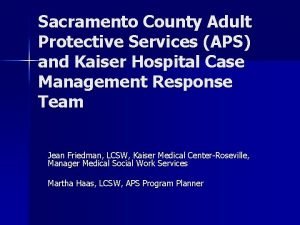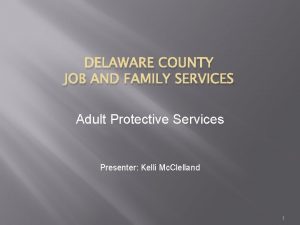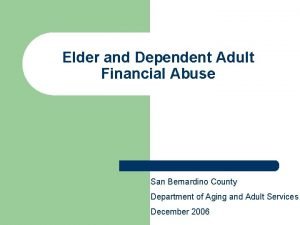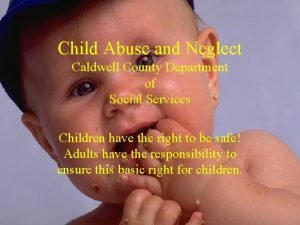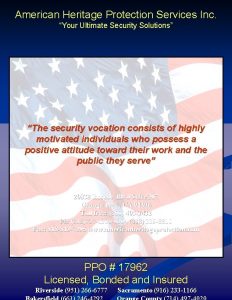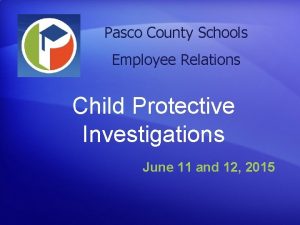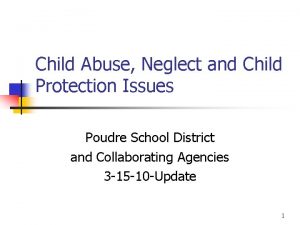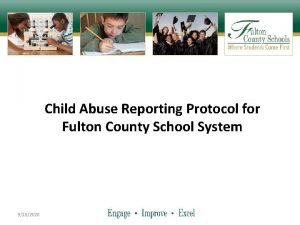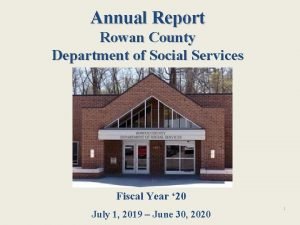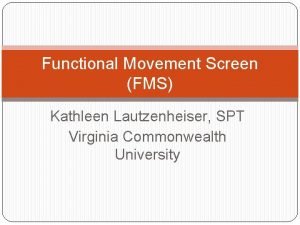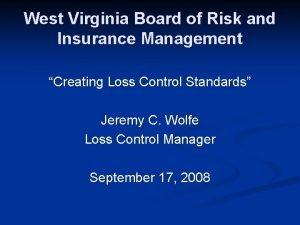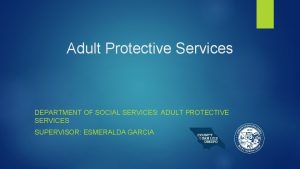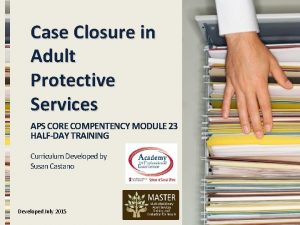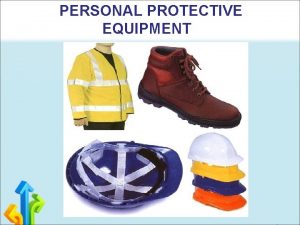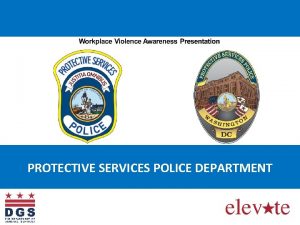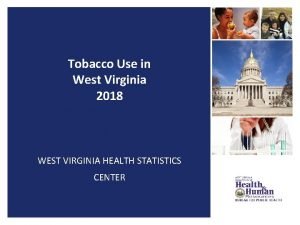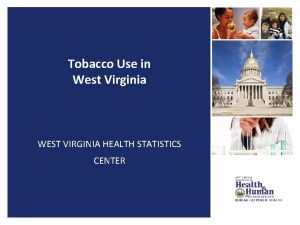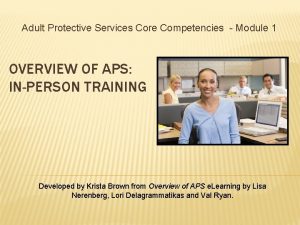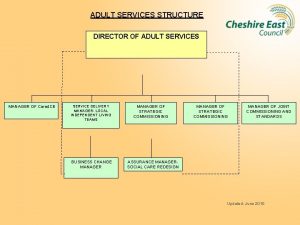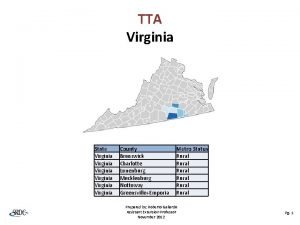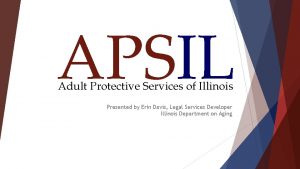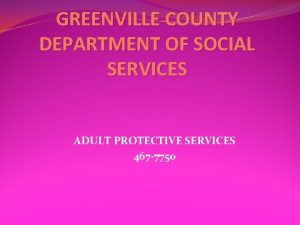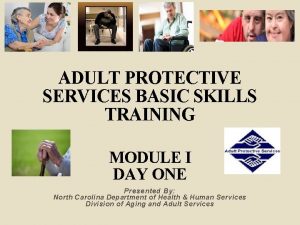ADULT PROTECTIVE SERVICES APS Agenda Overview West Virginia

























- Slides: 25

ADULT PROTECTIVE SERVICES (APS)

Agenda Overview § West Virginia Code § 9 -6 -1 § Mandatory Reporting § Adult Protective Service (APS) Intervention § Intake Eligibility Conclusion § Post Test § Acknowledgments 1

West Virginia Code § 9 -6 -1 2

WV Code § 9 -6 -1 (Cont. ) Legal Definition of an Incapacitated Adult • Any person, who by reason of physical, mental or other infirmity, is unable to physically carry on the daily activities of life necessary to sustaining life and reasonable health. 3

WV Code § 9 -6 -1 (Cont. ) Legal Definition of Abuse • The infliction of or threat to inflict physical pain or injury on or the imprisonment of any incapacitated adult or facility resident. • The unreasonable failure by a caretaker to provide the care necessary to assure the physical safety or health of an incapacitated adult or facility resident. • The unlawful expenditure or willful dissipation of funds or other assets owned or paid to or for the benefit of an incapacitated adult or facility resident. 4

Adult Protective Services Policy Terms • Financial Exploitation: A type of neglect of an incapacitated adult involving the illegal, unethical and/or improper use of, or willful dissipation of an individual’s funds, property or other assets by a person, formal or informal caregiver, family member or legal representative - either directly (i. e. , as the perpetrator) or indirectly (i. e. , by allowing or enabling the condition which permitted the financial exploitation). • Self-Neglect: The inability of an incapacitated adult to meet his/her own basic needs of daily living due to mental or physical incapacity. 5

Adult Protective Services Policy (Cont. ) Terms • Sexual Abuse: The coercion of an incapacitated adult or facility resident into having sexual contact with the perpetrator or another person. A caregiver of the incapacitated person or facility resident must be involved either directly (i. e. , as the perpetrator or sexual partner) or indirectly (by allowing or enabling the conditions which result in the sexual coercion). • Verbal Abuse: The threat to inflict physical pain or injury on or the imprisonment of any incapacitated adult or facility resident. The threat to inflict physical pain or injury includes, but is not limited to, threatening to withhold food, hydration and/or medical treatment. The threat to imprison includes, but is not limited to, isolation. The verbal threat(s) must be perceived by the client or others to be real. Non-malicious teasing does not constitute verbal abuse. 6

Mandatory Reporting 7

Mandatory Reporting WV CODE § 9 -6 -9 • Any individual may report known or suspected cases of abuse, neglect or emergent situations involving an incapacitated adult. • These reports may be referred to the 24 -hour Centralized Intake (CI) or by calling the CI hotline at 1 -800 -352 -6513. • If the incapacitated adult is willing and able, he/she may make a report on his/her own behalf. 8

Mandatory Reporting (Cont. ) Mandatory Reporters • Medical professionals • Dental professionals • Mental health professionals • Christian science practitioners • Religious healers • Social workers, including those employed by the WV Department of Health and Human Resources (DHHR) • Law enforcement officers • Humane officers • State or regional ombudsmen • Any employee of a nursing home • Any employee of a residential facility 9

Adult Protective Services Intervention 10

Adult Protective Services Intervention APS Programs • Adult Protective Services (APS) • Preventive Adult Protective Services (PAPS) 11

APS Intervention (Cont. ) Whenever the department becomes involved, the intervention provided must be at the least restrictive level possible and appropriate to meet the needs of the individual while assuring the highest degree of autonomy and self-determination as possible. This ensures the client’s right to self-determination. In general, the client's consent must be obtained before services are provided. However, there are times when APS intervention is mandated by law: • If a client is resistant to an investigation by Adult Protective Services; • If a client is in an emergency situation, appears to be incapacitated, and is unwilling to remove him/herself from danger. 12

APS Intervention (Cont. ) APS intervention includes: • Intake • Assessment of risks and needs • Case Management • Up to 12 months for an APS case • Up to 6 months for a Preventive (PAPS) case • Case Closure 13

Intake Eligibility 14

Intake Eligibility APS Eligibility Criteria • Must be an emancipated minor, or 18 years of age or older and incapacitated or a facility resident; and • Must be reported to be the a victim of abuse, neglect (including self-neglect) or in an emergency situation. • The investigation of a report of abuse, neglect, or an emergency situation involving an incapacitated adult or facility resident is not voluntary and must be brought to conclusion in all cases that are assigned for investigation. 15

Intake Eligibility (Cont. ) Centralized Intake • All reports of suspected adult abuse, neglect and exploitation must be called in immediately 24/7 at 1 -800 -352 -6513. 16

Intake Eligibility (Cont. ) As an APS referral, the following information must be collected: • Name of alleged victim • County of incident • Current location of the alleged victim • Age or date of birth of alleged victim • Phone number for the alleged victim • Directions to the alleged victim’s home or facility • Name and relationship of alleged perpetrator(s) • Other individuals involved in or who have knowledge of the incident 17

Intake Eligibility (Cont. ) As an APS referral, the following information must be collected: • Description of the alleged incident • Type of alleged abuse/neglect • Any resulting injuries and their location(s) • Where and when incident occurred • Physical and psychological description of the alleged victim • Reporter’s willingness to give their name • Relationship of the reporter to the alleged victim • Identification of the reporter as a mandatory reporter, when applicable • When a mandatory reporter, a written report must be submitted • If a referral is accepted or screened out, and the referral is made by a mandatory reporter, a notification letter is sent to the reporter The reporter information in an APS referral is confidential! 18

Intake Eligibility (Cont. ) Response Time Discussion • Elderly adult being discharged from the hospital to return to the care of an adult child substance abuser • Elderly person has fallen and can't get up • Caregiver leaving for new employment • Elderly person has no heat • Severely disabled person home alone 19

APS Investigative Timeframes Emergency faceto-face contact within zero to two hours 30 days to complete investigative disposition APS Intake Referral Potential for danger face-toface contact within 72 hours No imminent or potential danger face-to-face contact within 14 days 20

Post Test 21

Post Test True or False? 1. Caregiver abuse is acceptable. True or False? 2. Anyone has the potential to be an abuser. True or False? 3. Anyone has the potential to be a victim of abuse, neglect and/or exploitation. True or False? 4. I have the right to live any way I choose. True or False? 5. Signs of self-neglect include unkempt personal hygiene and rotten teeth. True or False? 6. Everyone taking this course is a mandated reporter. True or False? 7. Financial exploitation is an entitlement to family members. True or False? 8. Sexual abuse only happens to young people. True or False? 9. There are more women than men as victims of abuse. True or False? 10. Adult abuse is a silent epidemic. True or False? 22

Training Certificate AGED AND DISABLED WAIVER TRAINING CERTIFICATE Name of the Training: Adult Protective Services Date of Training Webinar: Name of the Employee (Worker): Congratulations! You have successfully completed the Aged and Disabled Waiver Adult Protective Services training webinar and passed the post test. Training/Post Test Verification Signature (Agency/Employer): Date: Worker/Employee Signature: Date: 23

Acknowledgements This information was provided by the West Virginia Bureau for Children and Families Division of Training Thank You! 24
 Wv aps
Wv aps Adult protective services vancouver wa
Adult protective services vancouver wa Sacramento county aps
Sacramento county aps Delaware county adult protective services
Delaware county adult protective services Heap westchester county
Heap westchester county Aps report san bernardino
Aps report san bernardino Agenda sistemica y agenda institucional
Agenda sistemica y agenda institucional Caldwell county department of social services
Caldwell county department of social services Dfw protective services
Dfw protective services American heritage protective services
American heritage protective services Child protective investigations pasco county
Child protective investigations pasco county Integrated protective services
Integrated protective services Crs 19-3-304
Crs 19-3-304 Cps lorain county
Cps lorain county In georgia mandated reporters include
In georgia mandated reporters include Micah ennis
Micah ennis Northern virginia seo
Northern virginia seo West virginia view
West virginia view Degree works wvu
Degree works wvu Wv general summative assessment
Wv general summative assessment Wv airast secure browser
Wv airast secure browser West virginia alternative teacher certification
West virginia alternative teacher certification Characteristics of gifted students
Characteristics of gifted students Performance pyramid fms
Performance pyramid fms Risk management west virginia
Risk management west virginia West virginia to louisiana
West virginia to louisiana
